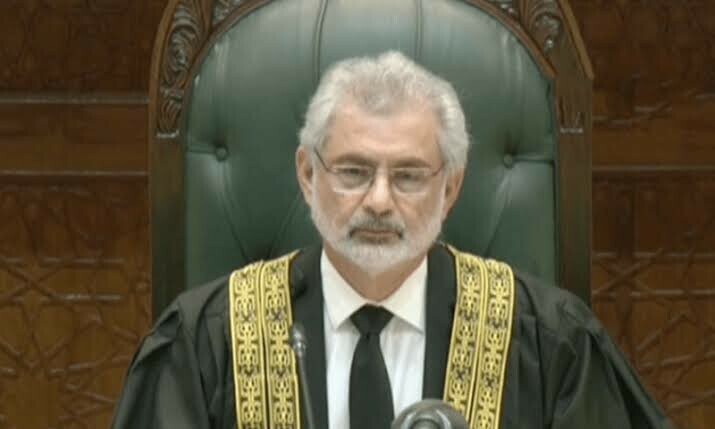
[ad_1]

ISLAMABAD: After much ado, the Supreme Court finally commenced hearing the Supreme Court Bar Association’s (SCBA) review petition against the May 17, 2022, short order on the defection clause under Article 63A, after Justice Munib Akhtar and senior puisne judge Justice Syed Mansoor Ali Shah successively chose not to sit on the larger bench.
After Justice Munib Akhtar reiterated his stance of not sitting on the bench, despite a request by the court, Chief Justice of Pakistan (CJP) Qazi Faez Isa called a meeting of the three-judge committee under the Supreme Court (Practice and Procedure) Ordinance early Tuesday morning to consider his substitute and proposed the name of Justice Syed Mansoor Ali Shah.
After Justice Mansoor did not attend the meeting, his secretary Sadaqat Hussain was contacted. The secretary said that the judge would not be participating in the meeting and would not sit on the bench, either. Consequently, Justice Naeem Akhtar Afghan was added to the bench.
After Justice Akhtar, Justice Shah also refuses to join larger bench; Justice Afghan enlisted to hear the case
‘Merger of constitutional jurisdictions’
During the hearing, the CJP poked holes in the opinion rendered by the previous larger bench on the presidential reference and wondered how two constitutional jurisdictions could be merged. The CJP was alluding to the larger bench’s decision to hear the presidential reference under Article 186 (advisory jurisdiction) along with a petition under Article 184(3) of the Constitution.
“Are these jurisdictions different or the same; how could they be clubbed together,” the CJP wondered, explaining that under the presidential references, the court was supposed to give its opinion, whereas Article 184(3) provided the apex court jurisdiction under Article 199 for the enforcement of fundamental rights.
The CJP highlighted that the president could not be arraigned for contempt for not implementing the court opinion under the presidential reference but the same could be done for not implementing its orders under Article 184(3) of the Constitution. He was also surprised at how the PTI simultaneously moved the reference as well as the petition.
In its opinion of May 17, 2022, the Supreme Court held by a majority of three to two that Article 63A ensured the fundamental rights of a parliamentary party rather than the individual member; therefore, the vote polled contrary to the party lines should not be counted.
‘Rewrote the Constitution’
When SCBA President Shahzad Shaukat read out four questions put to the Supreme Court by former president Dr Arif Alvi through the presidential reference, the CJP wondered whether these questions were general questions in nature or loaded questions.
The counsel read out the four questions one by one, as well as the opinion rendered by the court and stressed that the majority judgement went on to rewrite the constitution through the opinion it rendered. Citing a number of judgements, the counsel argued that the previous judgements had held that Article 63A of the Constitution was perfectly a valid piece of legislation.
Additional Attorney General (AAG) Chaudhry Aamir Rehman, who opposed the opinion on the presidential reference on behalf of the federal government, explained that disqualification was left to the discretion of the party head.
The CJP observed that if a vote against the party line was not going to be counted as per the opinion, then wouldn’t it negate Article 95 (no-confidence motion) of the Constitution? He further asked about the purpose of balloting if a vote was not to be counted. The situation after the judgement is that now the party is stuck with the whims of the party head in perpetuity, he observed.
He observed the matter of conscientious objector could be adjudicated upon, but what would be the gauge to determine it? The CJP also cited the example of the United Kingdom to substantiate his point, where several prime ministers had been removed by the party members.
The Supreme Court, however, asked the counsel to come prepared to the next hearing about practices in the UK, USA, Canada, and Australia, especially how the party members behaved if they were not happy with the direction of the party head.
The court also ignored the request of Syed Ali Zafar, representing Imran Khan, to issue notice, saying the case was a widely reported case where no adversarial proceedings were taking place or the rights of any individual had been affected.
Even former President Dr Arif Alvi could join the proceedings if it suits him since he had filed the reference, the CJP observed, adding the court would hear anyone wanting to assist the court.
However, it did not allow Ali Zafar to raise his objection on the composition of the bench, saying the court would hear his opposition on his turn.
Published in Dawn, October 2nd, 2024
[ad_2]
Source link






